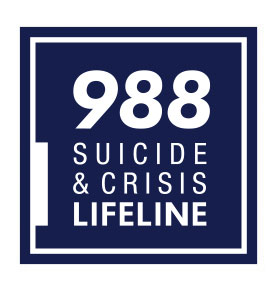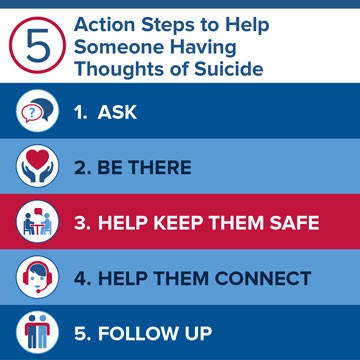At times, the challenges of life can become increasingly hard to navigate and can lead to feelings of distress and thoughts of self-harm. The College wants to ensure that all students, faculty, and staff are aware of the risk factors, warning signs, and resources available to anyone experiencing a mental health crisis. If you or someone you know is experiencing suicidal thoughts, there are many ways to get immediate help.
Suicide Prevention Hotlines
 National
National
- 988 Suicide & Crisis Lifeline – Get confidential help for yourself or a loved one by calling or texting the number 988
State and Local
- Berks County Crisis – 610-379-2007
- Bucks County Mobile Crisis (Lenape) – 1-877-435-7709
- Chester County Crisis – 610-280-3270
- ChildLine, child abuse hotline – 1-800-932-0313
- Delaware County Crisis– 1-855-889-7827
- Montgomery County Mobile Crisis – 1-855-634-HOPE (4673)
- City of Philadelphia Crisis – 215-685-6440
- Veterans Crisis Line – Dial 988 and press 1 or text: 838255
- National Hunger Hotline (WhyHunger.org) food helpline – 1-800-5-HUNGRY (486479)
Crisis Intervention Services
On Campus (24hrs/day)
Contact the College’s Department of Public Safety.
- Blue Bell Campus – 215-641-6666
- Pottstown Campus – 610-718-1913
Off Campus (mobile crisis response; 24hrs/day)
- Montgomery County Mobile Crisis is here to help you. Montgomery County Mobile Crisis provides not only immediate support for crisis situations, but also assistance with managing recurring or future crises. Support is available to anyone in Montgomery County (including children, teens, adults, and families) 24 hours a day, 7 days a week at 1-855-634-HOPE (4673)
- Bucks County (Lenape Valley) Crisis Services Line – 1-800-499-7455
- Chester County (Valley Creek) Crisis Services – 610-280-3270
- Delaware County Crisis Connections Team – 1-855-889-7827
- Lehigh County Crisis Intervention – 610-782-3127
- City of Philadelphia 24-Hour Mental Health Delegate Line – 215-685-6440
Mental Health Services
Certain services may also be accessible via a mobile device.
TimelyCare Telehealth for Students
Montco provides convenient, personal, and professional mental health and telehealth support to students through TimelyCare. This digital space offers counseling, therapy, psychiatry, and telehealth services from licensed providers. Current students can access the log in details through Montco Connect.
Resources for Employees
Carebridge is the College’s employee assistance program that offers free and confidential guidance and counseling available 24/7 with licensed clinicians; support options include 10 in-person or telehealth referrals, text, and chat. Find information about Carebridge.
Local Support
- Montgomery County Mental and Behavioral Health – available Monday - Friday, 8 a.m. - 4:30 p.m. Call 610-278-3642
- Montgomery County Mental Health Services Guide - Roadmap to Recovery
- National Alliance for Mental Illness (NAMI) PA Montgomery County – NAMI is now offering Virtual Support Groups: Recovery Support, Family Support and NAMIWellness Chats for anyone.
- Montgomery County Community Connections Navicate Program – a 'Navicate' can point you in the right direction, and even refer you to a variety of resources based on need
- Central Behavioral Health - located in Norristown and Willow Grove; a non-profit community organization helping people of all ages
- St. Luke's Penn Foundation – located in Sellersville, the St. Luke's Penn Foundation offers a variety of programs and services ranging from crisis services to yoga classes
- Creative Health Services, Inc – offices in Pottstown and surrounding areas, providing outpatient support across the lifespan
- Merakey – formerly known as NHS Human Services, offers behavioral health services in Lansdale
- Victim Services Center of Montgomery County – 24-hour crisis line available - 1-888-521-0983
- Find a Mental Health Practitioner with Psychology Today
- The Resiliency Center – The Resiliency Center of Greater Philadelphia is home to multiple independent practitioners who work mindfully to promote holistic wellness.
Support Groups
National Support & Hotlines
- Jed Foundation (JED) – offers resources for students and universities to support young people’s mental health
- Mental Health Is Health – video resources and personal stories on mental health and substance abuse
- 988 Suicide & Crisis Lifeline – Get help for yourself or a loved one by calling or texting the number 988
- Substance Abuse and Mental Health Services Administration (SAMHSA) – A free, confidential national helpline, 1-800-662-HELP (4357)
- Open Counseling – Free telephone counseling hotlines in the U.S.
- Crisis Text Line – a free, 24/7, confidential text message service for people in crisis. Text HOME to 741741 in the United States.
- National Domestic Violence Hotline – get help without saying a word. Online chat is available 24/7/365 or you can call 1-800-799-7233
- Trans Lifeline – Trans Lifeline connects trans people to the community, support, and resources they need to survive and thrive. Call 877-565-8860.
- The Trevor Project – providing crisis intervention and suicide prevention services to lesbian, gay, bisexual, transgender, queer & questioning youth. Call 1-866-488-7386, text START to 678678 or chat online 24/7.
- Childhelp National Child Abuse Hotline – offers crisis intervention, information, and referrals to thousands of emergency, social service, and support resources. Call 1-800-422-4453.
- National Eating Disorders Association (NEDA) – contact the Helpline for support, resources and treatment options for yourself or a loved one. Call 988 or text NEDA to 741741.
- Eating Disorder Hope – several eating disorder hotlines you can call 24/7 for yourself or a loved one
- National Sexual Assault Telephone Hotline – call 800-656-HOPE (4673) to be connected with a trained staff member from a sexual assault service provider in your area.
How to Help Someone Else
Here are 5 steps you can take to #BeThe1To help someone who is having thoughts of suicide:

ASK: “Are you thinking about suicide?” It’s not an easy question to ask, but it can help start a conversation. Studies show that asking people if they are suicidal does not increase suicidal behavior or thoughts.
BE THERE: Listening without judgment is key to learning what the person is thinking and feeling. Research suggests acknowledging and talking about suicide may reduce suicidal thoughts.
HELP KEEP THEM SAFE: Reducing access to highly lethal items or places can help prevent suicide. Asking the person if they have a plan and making lethal means less available or less deadly can help the person stay safe when suicidal thoughts arise.
HELP THEM CONNECT: Connecting the person with the 988 Suicide & Crisis Lifeline (call or text 988) and other community resources can give them a safety net when they need it. You can also help them reach out to a trusted family member, friend, spiritual advisor, or mental health professional.
FOLLOW UP: Staying in touch with the person after they have experienced a crisis or been discharged from care can make a difference. Studies show that supportive, ongoing contact can play an important role in suicide prevention.
Learn more about suicide prevention and the #BeThe1To campaign.
Suicide Warning Signs and Risk Factors
Warning Signs
- Talking about suicide, wanting to die, kill oneself
- Looking for a way to kill oneself, such as searching online or buying a gun
- Having a plan for carrying out suicide
- Talking about feeling worthless, hopeless, or having no reason to live
- Talking about being a burden to others
- Suddenly happier and calmer, especially after a period of depression or sadness
- Giving away prized possessions
- Getting affairs in order; making arrangements
- Increasing alcohol or drug use
- Preoccupation with death
- Acting anxiously or agitated; behaving recklessly.
- Sleeping too little or too much
- Withdrawal from or changing in social connections/situations
- Showing rage or talking about seeking revenge.
- Displaying extreme mood swings
- Anger or hostility that seems out of character or out of context
- Recent increased agitation or irritability
Risk Factors
- Diagnosis of depression
- Previous suicide attempt
- Family history of suicide
- Loss of job, home, money
- Death or terminal illness of a loved one
- Divorce or loss of a major, significant relationship
- Loss of health, either real or imagined
- Someone close to the person has completed suicide
- Recent disappointment or rejection
- Being expelled from school/fired from job
- Sudden loss of freedom/fear of punishment
- Victim of assault or bullying
- Questioning gender
Reference: Prevent Suicide PA website.
What to Expect if You Seek Help
Emergency Care: What to Expect
- If you call 9-8-8:
If you call 988, you will first hear a greeting message. You are given choices of who to connect with in the greeting; the 988 Lifeline has specially trained counselors for Veterans (through the Veterans Crisis Line, operated by the Veteran’s Administration), Spanish speakers and LGBTQI+ youth and young adults. Your call is then routed to one of the national networks or a local 988 Lifeline network crisis center based on your selections and then based on your phone’s area code. A trained crisis counselor answers the phone, listens to you, works to understand how your problem is affecting you, provides support, and shares resources if needed. - If you call Mobile Crisis:
Your location and name will be inquired about by the caller. They might also inquire about the type of insurance you have since this information will be helpful if they need to contact care. They will listen to you and offer support and encouragement as you discuss what is going on and how you are feeling. They will offer to follow up with you and put you in touch with resources like counseling if, after talking with you, you start feeling better. A crisis worker will come meet you at a location of your choice if you believe that you are still in crisis. They will then talk with you and assist you in determining what kind of assistance you require. If the crisis worker, whether in person or over the phone, believes you are in imminent danger, they will call for an emergency response. - If you go to an Emergency Room:
Bring an identification document, insurance card, emergency contact information, and an extra change of clothes, if feasible. The check-in clerk will meet you when you arrive. Tell them why you are in the area. You might need to wait in the waiting area for a while depending on how serious the situation is. A nurse, an emergency room physician, a social worker, and sometimes a psychiatrist will examine you. They will take your vitals even though you are there for suicide thoughts. They will decide whether to admit you after speaking with the necessary assistance or look for another facility that can help you further. - If you go to a Psychiatric Hospital:
The procedure resembles an ER in every way. It is likely that a social worker, intake worker, and psychiatrist will assess you. This process may take a few hours. The social worker at the hospital can assist in making referrals to community resources such as counseling, support groups, or your neighborhood community mental health center if the evaluation results show that you do not require inpatient treatment.
Communication Plans
Suicide Prevention Communication Plan
Montco’s Wellness Center working with Strategic Marketing & Communications will deploy suicide prevention communications twice per year: at the start of the Fall (September) and Spring (January) semesters. In addition, mental health and stress management resources will be shared at the start of finals weeks in December and May.
The communications will be sent to students and employees via email and through Montco Connect. These communications will highlight suicide awareness information with a link to free crisis response and mental health resources in this Suicide Prevention Plan page. Additionally, Montco’s Wellness Center will run an awareness campaign to encourage suicide prevention and mental health awareness to the surrounding community. The campaign will be deployed in September, as part of National Suicide Prevention Awareness month, and in May, as part of Mental Health Awareness Month through a variety of channels, including Montco Connect, social media, digital signage, etc.
Postvention and Communication Plan
Email: [email protected]

